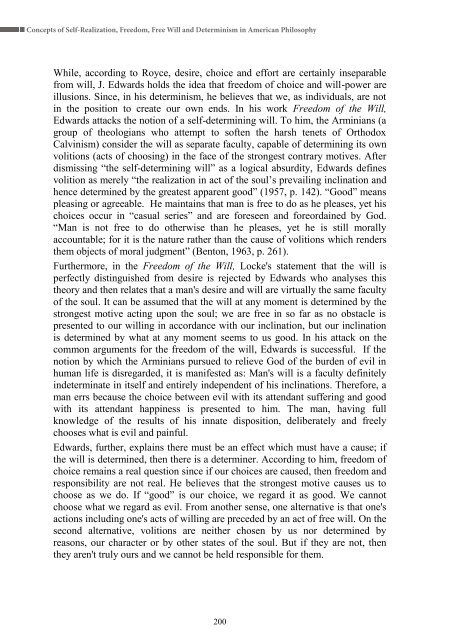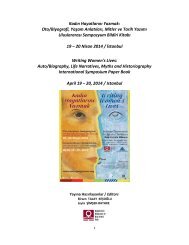- Page 1:
ISSN: 2147-088XHUMANITASULUSLARARAS
- Page 5:
HUMANITASUluslararas Sosyal Bilimle
- Page 9 and 10:
İÇİNDEKİLER / CONTENTSAli TİLB
- Page 11 and 12:
SUNUŞÜçüncü saysndan itibaren
- Page 13 and 14:
olarak Franszcann öğretiminde far
- Page 15 and 16:
PRESENTATIONOur Journal previously
- Page 17 and 18:
study conducted with 19 students, a
- Page 19 and 20:
HUMANITAS Sayı - Number: 4Güz / A
- Page 21 and 22:
Hülya Bayrak AKYILDIZ(Brenot, 1921
- Page 23 and 24:
Hülya Bayrak AKYILDIZanlar. Yurdun
- Page 25 and 26:
Hülya Bayrak AKYILDIZpolis zoruyla
- Page 27 and 28:
Hülya Bayrak AKYILDIZolunabilir, e
- Page 29 and 30:
Hülya Bayrak AKYILDIZBu isimsiz ya
- Page 31:
Hülya Bayrak AKYILDIZliterature th
- Page 34 and 35:
Basic Design Education Parameters i
- Page 36 and 37:
Basic Design Education Parameters i
- Page 38 and 39:
Basic Design Education Parameters i
- Page 40 and 41:
Basic Design Education Parameters i
- Page 42 and 43:
Basic Design Education Parameters i
- Page 44 and 45:
Basic Design Education Parameters i
- Page 46 and 47:
Basic Design Education Parameters i
- Page 48 and 49:
Basic Design Education Parameters i
- Page 50 and 51:
Sınav ve İktidarolarak tanmlanmak
- Page 52 and 53:
Sınav ve İktidar"Öğretmen, kura
- Page 54 and 55:
Sınav ve İktidar“iktidar mekani
- Page 56 and 57:
Sınav ve İktidardayal iktidar hak
- Page 58 and 59:
Sınav ve İktidarbrakmaktadr. Tür
- Page 60 and 61:
Sınav ve İktidar…Okullar resmi
- Page 62 and 63:
Sınav ve İktidarplace recently, i
- Page 64 and 65:
Peter Ackroyd’s Chatterton: Histo
- Page 66 and 67:
Peter Ackroyd’s Chatterton: Histo
- Page 68 and 69:
Peter Ackroyd’s Chatterton: Histo
- Page 70 and 71:
Peter Ackroyd’s Chatterton: Histo
- Page 72 and 73:
Peter Ackroyd’s Chatterton: Histo
- Page 74 and 75:
Peter Ackroyd’s Chatterton: Histo
- Page 77 and 78:
HUMANITAS Sayı - Number: 4Güz / A
- Page 79 and 80:
Feryal ÇUBUKÇU - Merve GÜVENs. 2
- Page 81 and 82:
Feryal ÇUBUKÇU - Merve GÜVENhast
- Page 83 and 84:
Feryal ÇUBUKÇU - Merve GÜVENgire
- Page 85 and 86:
Feryal ÇUBUKÇU - Merve GÜVENkork
- Page 87 and 88:
Feryal ÇUBUKÇU - Merve GÜVENLant
- Page 89 and 90:
HUMANITAS Sayı - Number: 4Güz / A
- Page 91 and 92:
Anzavur DEMİRPOLAT - Sıtkı YILDI
- Page 93 and 94:
Anzavur DEMİRPOLAT - Sıtkı YILDI
- Page 95 and 96:
Anzavur DEMİRPOLAT - Sıtkı YILDI
- Page 97 and 98:
Anzavur DEMİRPOLAT - Sıtkı YILDI
- Page 99 and 100:
Anzavur DEMİRPOLAT - Sıtkı YILDI
- Page 101 and 102:
Anzavur DEMİRPOLAT - Sıtkı YILDI
- Page 103 and 104:
Anzavur DEMİRPOLAT - Sıtkı YILDI
- Page 105 and 106:
Anzavur DEMİRPOLAT - Sıtkı YILDI
- Page 107 and 108:
Anzavur DEMİRPOLAT - Sıtkı YILDI
- Page 109 and 110:
Anzavur DEMİRPOLAT - Sıtkı YILDI
- Page 111 and 112:
HUMANITAS Sayı - Number: 4Güz / A
- Page 113 and 114:
Ümit EKİN - Hümmet KANALdoğuda
- Page 115 and 116:
Ümit EKİN - Hümmet KANALMüftü
- Page 117 and 118:
Ümit EKİN - Hümmet KANALYüzdeli
- Page 119 and 120:
Ümit EKİN - Hümmet KANALyaşadğ
- Page 121 and 122:
Ümit EKİN - Hümmet KANAL1319 sal
- Page 123 and 124:
Ümit EKİN - Hümmet KANALTekfurda
- Page 125 and 126:
Ümit EKİN - Hümmet KANALbir haft
- Page 127 and 128:
Ümit EKİN - Hümmet KANALkuruş g
- Page 129 and 130:
Ümit EKİN - Hümmet KANALTuncel,
- Page 131 and 132:
HUMANITAS Sayı - Number: 4Güz / A
- Page 133 and 134:
Hanife Nâlân GENÇ - Songül Erdo
- Page 135 and 136:
Hanife Nâlân GENÇ - Songül Erdo
- Page 137 and 138:
Hanife Nâlân GENÇ - Songül Erdo
- Page 139 and 140:
Hanife Nâlân GENÇ - Songül Erdo
- Page 141 and 142:
Hanife Nâlân GENÇ - Songül Erdo
- Page 143 and 144:
HUMANITAS Sayı - Number: 4Güz / A
- Page 145 and 146:
Zühre Yılmaz GÜNGÖRöğrenciler
- Page 147 and 148:
Zühre Yılmaz GÜNGÖRweek-end Se
- Page 149 and 150:
Zühre Yılmaz GÜNGÖRdolaysyla da
- Page 151 and 152: Zühre Yılmaz GÜNGÖR8. Öğrenci
- Page 153 and 154: Zühre Yılmaz GÜNGÖRMorlat, J. -
- Page 155 and 156: HUMANITAS Sayı - Number: 4Güz / A
- Page 157 and 158: Emine GÜZELmémoire universelle de
- Page 159 and 160: Emine GÜZELêtre conscient. Le psy
- Page 161 and 162: Emine GÜZELimprévisible présence
- Page 163 and 164: Emine GÜZELLe récit a commencé p
- Page 165 and 166: Emine GÜZELYasmine, Y. (25 septemb
- Page 167 and 168: HUMANITAS Sayı - Number: 4Güz / A
- Page 169 and 170: Cahit KAHRAMAN- Buğra ZENGİNmemor
- Page 171 and 172: Cahit KAHRAMAN- Buğra ZENGİN4. Me
- Page 173 and 174: Cahit KAHRAMAN- Buğra ZENGİN“no
- Page 175 and 176: Cahit KAHRAMAN- Buğra ZENGİNand e
- Page 177 and 178: Cahit KAHRAMAN- Buğra ZENGİN16. I
- Page 179 and 180: Cahit KAHRAMAN- Buğra ZENGİNfemal
- Page 181 and 182: Cahit KAHRAMAN- Buğra ZENGİNthe a
- Page 183 and 184: Cahit KAHRAMAN- Buğra ZENGİN(cevi
- Page 185 and 186: HUMANITAS Sayı - Number: 4Güz / A
- Page 187 and 188: Yakup KURTyitirilen insanlk değeri
- Page 189 and 190: Yakup KURTYasalar hakka yabanc 6Bar
- Page 191 and 192: Yakup KURTGöç olgusunu iliklerine
- Page 193 and 194: Yakup KURTdünyay kurtarmayaklcn ku
- Page 195 and 196: Yakup KURTve analarmz,dünya analar
- Page 197 and 198: Yakup KURTminorities living in thes
- Page 199 and 200: HUMANITAS Sayı - Number: 4Güz / A
- Page 201: Özlem ÖZENultimate Individual. Th
- Page 205 and 206: Özlem ÖZENEmerson’s faith is ba
- Page 207 and 208: Özlem ÖZENHaldar, H. (1899). The
- Page 209 and 210: HUMANITAS Sayı - Number: 4Güz / A
- Page 211 and 212: Duygu Öztin PASSERATsöylenen şey
- Page 213 and 214: Duygu Öztin PASSERATdüşünmekted
- Page 215 and 216: Duygu Öztin PASSERATsöyleminde en
- Page 217 and 218: Duygu Öztin PASSERATbu bağlamdaki
- Page 219 and 220: Duygu Öztin PASSERATBenim oğlum b
- Page 221 and 222: Duygu Öztin PASSERATİkinci ve ü
- Page 223 and 224: Duygu Öztin PASSERATmihrak” olar
- Page 225 and 226: Duygu Öztin PASSERATAydn, E. (Derl
- Page 227 and 228: HUMANITAS Sayı - Number: 4Güz / A
- Page 229 and 230: Jale SEZEN - Ahmet KUBAŞsanayi kur
- Page 231 and 232: Jale SEZEN - Ahmet KUBAŞverilen ev
- Page 233 and 234: Jale SEZEN - Ahmet KUBAŞalnmas ile
- Page 235 and 236: Jale SEZEN - Ahmet KUBAŞKrklareli-
- Page 237 and 238: Jale SEZEN - Ahmet KUBAŞAnonim (20
- Page 239 and 240: HUMANITAS Sayı - Number: 4Güz / A
- Page 241 and 242: Hakan SOYDAŞ1. Voltaire ve İmgele
- Page 243 and 244: Hakan SOYDAŞYazar yaşadğ tecrüb
- Page 245 and 246: Hakan SOYDAŞarasnda canl bir iliş
- Page 247 and 248: Hakan SOYDAŞtanmlamak için kullan
- Page 249 and 250: Hakan SOYDAŞ5. Felsefe-Bilim Çat
- Page 251 and 252: Hakan SOYDAŞellisini” çözmüş
- Page 253 and 254:
Hakan SOYDAŞzihninde, kendi iç d
- Page 255 and 256:
Hakan SOYDAŞ(…) Bütün bu daval
- Page 257 and 258:
Hakan SOYDAŞbooks. (Tr. Edward Wil
- Page 259 and 260:
Hakan SOYDAŞcommon thematic and st
- Page 261 and 262:
HUMANITAS Sayı - Number: 4Güz / A
- Page 263 and 264:
Sevda Gülşah YILDIRIM - Eren YÜR
- Page 265 and 266:
Sevda Gülşah YILDIRIM - Eren YÜR
- Page 267 and 268:
Sevda Gülşah YILDIRIM - Eren YÜR
- Page 269 and 270:
Sevda Gülşah YILDIRIM - Eren YÜR
- Page 271 and 272:
Sevda Gülşah YILDIRIM - Eren YÜR
- Page 273 and 274:
Sevda Gülşah YILDIRIM - Eren YÜR
- Page 275 and 276:
Sevda Gülşah YILDIRIM - Eren YÜR
- Page 277 and 278:
Sevda Gülşah YILDIRIM - Eren YÜR
- Page 279 and 280:
Sevda Gülşah YILDIRIM - Eren YÜR
- Page 281 and 282:
YAYIN DEĞERLENDİRME / REVIEWAsuta
- Page 283 and 284:
HUMANITASUluslararas Sosyal Bilimle
- Page 285 and 286:
Alt Kenar BoşlukSol Kenar BoşlukS
- Page 287 and 288:
Yasa ve Yönetmelikler: İlköğret
- Page 289 and 290:
Müzik Kayd: Erkin, U. C. (1995). A
- Page 291 and 292:
HUMANITASInternational Journal of S
- Page 293 and 294:
Bottom Margin 2,5 cmLeft Margin2,5
- Page 295 and 296:
Encyclopedia subject: Ersoy, O. (19
- Page 297:
Erkin, U. C. (1932). Improvisation
















